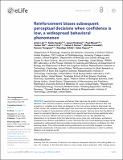| dc.contributor.author | Lak, Armin | |
| dc.contributor.author | Hueske, Emily | |
| dc.contributor.author | Hirokawa, Junya | |
| dc.contributor.author | Masset, Paul | |
| dc.contributor.author | Ott, Torben | |
| dc.contributor.author | Urai, Anne E | |
| dc.contributor.author | Donner, Tobias H | |
| dc.contributor.author | Carandini, Matteo | |
| dc.contributor.author | Tonegawa, Susumu | |
| dc.contributor.author | Uchida, Naoshige | |
| dc.contributor.author | Kepecs, Adam | |
| dc.date.accessioned | 2021-10-27T20:29:57Z | |
| dc.date.available | 2021-10-27T20:29:57Z | |
| dc.date.issued | 2020 | |
| dc.identifier.uri | https://hdl.handle.net/1721.1/135923 | |
| dc.description.abstract | © 2020, eLife Sciences Publications Ltd. All rights reserved. Learning from successes and failures often improves the quality of subsequent decisions. Past outcomes, however, should not influence purely perceptual decisions after task acquisition is complete since these are designed so that only sensory evidence determines the correct choice. Yet, numerous studies report that outcomes can bias perceptual decisions, causing spurious changes in choice behavior without improving accuracy. Here we show that the effects of reward on perceptual decisions are principled: past rewards bias future choices specifically when previous choice was difficult and hence decision confidence was low. We identified this phenomenon in six datasets from four laboratories, across mice, rats, and humans, and sensory modalities from olfaction and audition to vision. We show that this choice-updating strategy can be explained by reinforcement learning models incorporating statistical decision confidence into their teaching signals. Thus, despite being suboptimal from the experimenter’s perspective, confidence-guided reinforcement learning optimizes behavior in uncertain, real-world situations. | |
| dc.language.iso | en | |
| dc.publisher | eLife Sciences Publications, Ltd | |
| dc.relation.isversionof | 10.7554/ELIFE.49834 | |
| dc.rights | Creative Commons Attribution 4.0 International license | |
| dc.rights.uri | https://creativecommons.org/licenses/by/4.0/ | |
| dc.source | eLife | |
| dc.title | Reinforcement biases subsequent perceptual decisions when confidence is low, a widespread behavioral phenomenon | |
| dc.type | Article | |
| dc.contributor.department | Picower Institute for Learning and Memory | |
| dc.contributor.department | Massachusetts Institute of Technology. Department of Biology | |
| dc.contributor.department | Massachusetts Institute of Technology. Department of Brain and Cognitive Sciences | |
| dc.contributor.department | McGovern Institute for Brain Research at MIT | |
| dc.contributor.department | Howard Hughes Medical Institute | |
| dc.relation.journal | eLife | |
| dc.eprint.version | Final published version | |
| dc.type.uri | http://purl.org/eprint/type/JournalArticle | |
| eprint.status | http://purl.org/eprint/status/PeerReviewed | |
| dc.date.updated | 2021-08-03T12:54:22Z | |
| dspace.orderedauthors | Lak, A; Hueske, E; Hirokawa, J; Masset, P; Ott, T; Urai, AE; Donner, TH; Carandini, M; Tonegawa, S; Uchida, N; Kepecs, A | |
| dspace.date.submission | 2021-08-03T12:54:25Z | |
| mit.journal.volume | 9 | |
| mit.license | PUBLISHER_CC | |
| mit.metadata.status | Authority Work and Publication Information Needed | |
